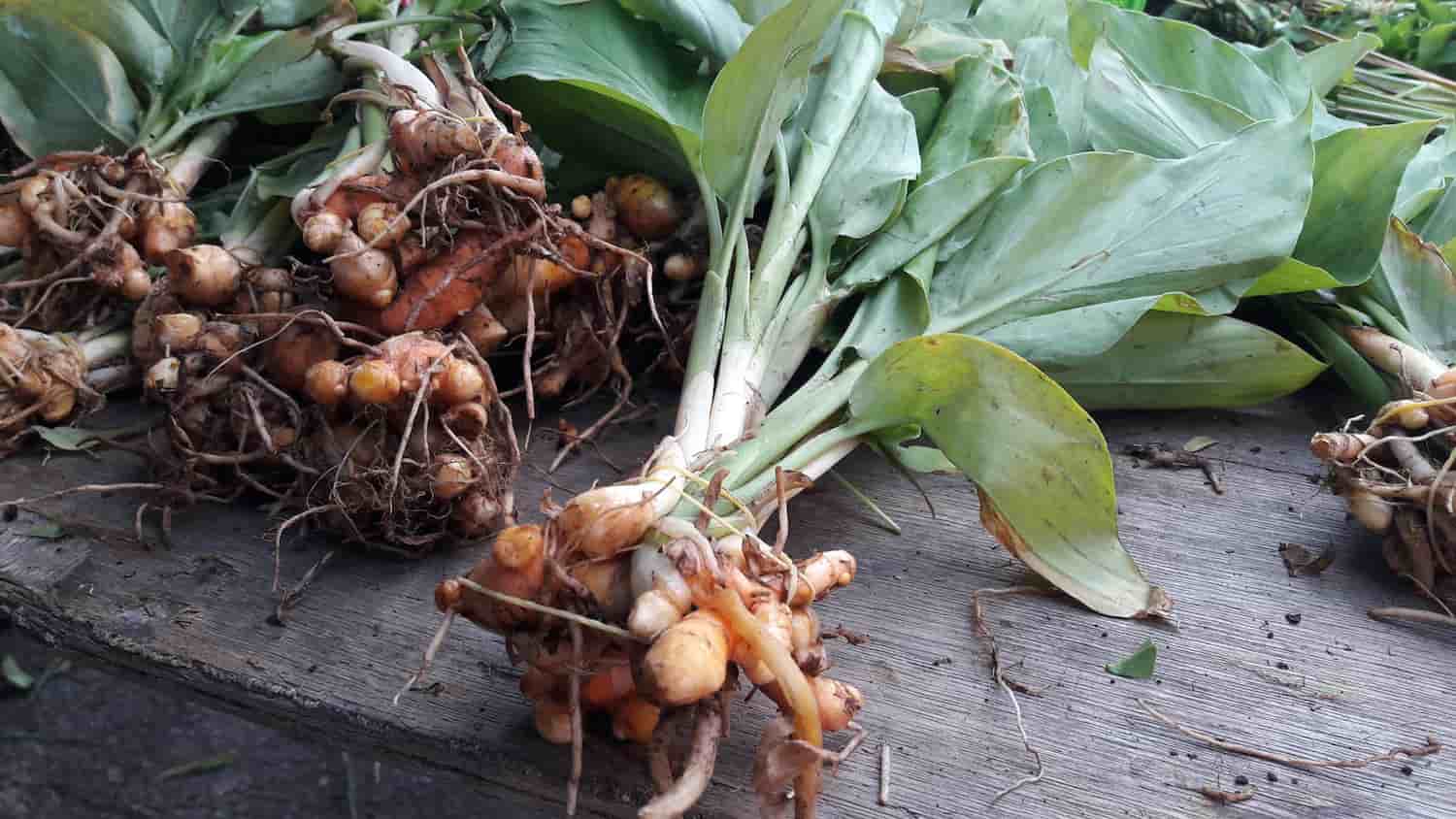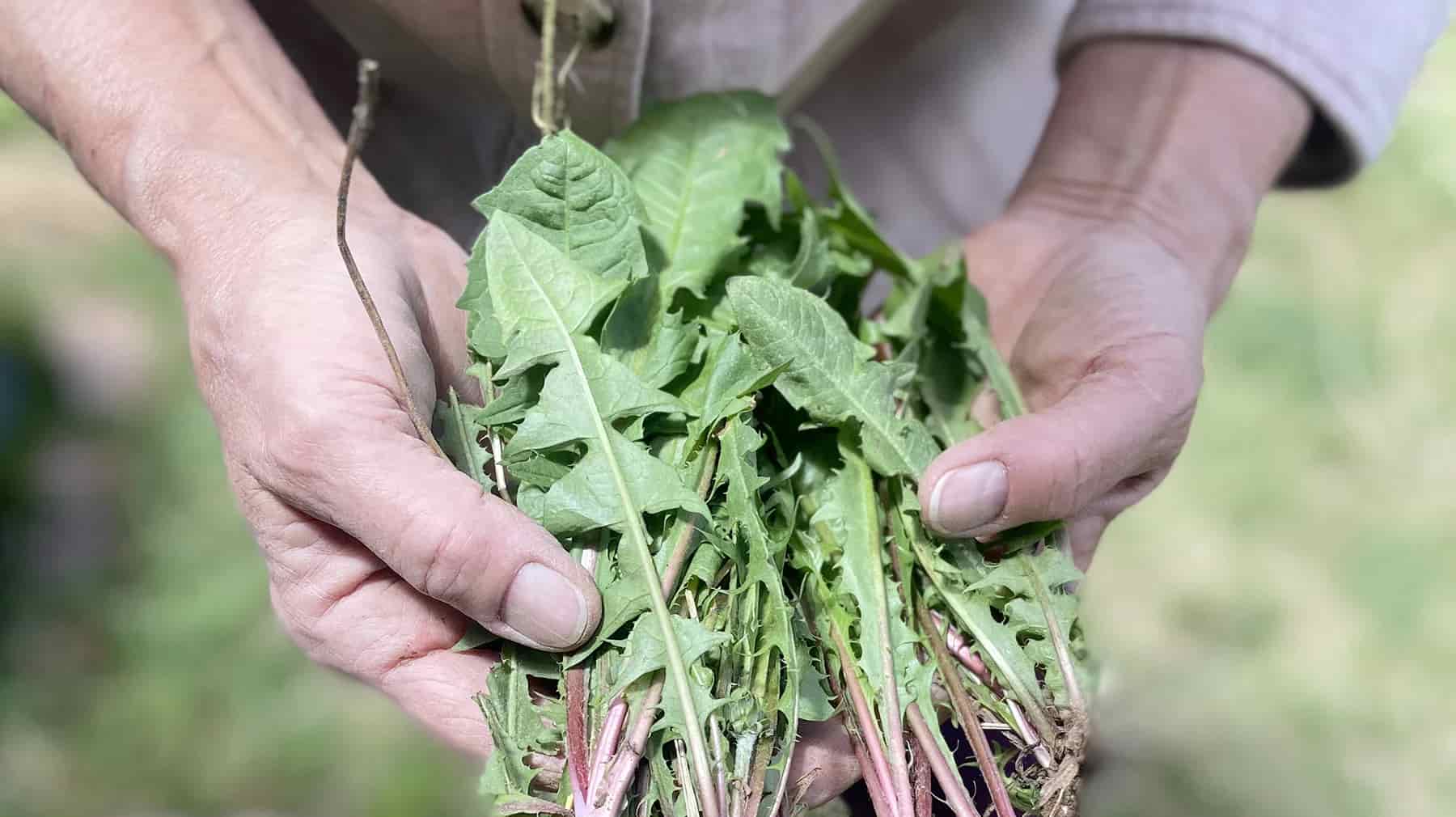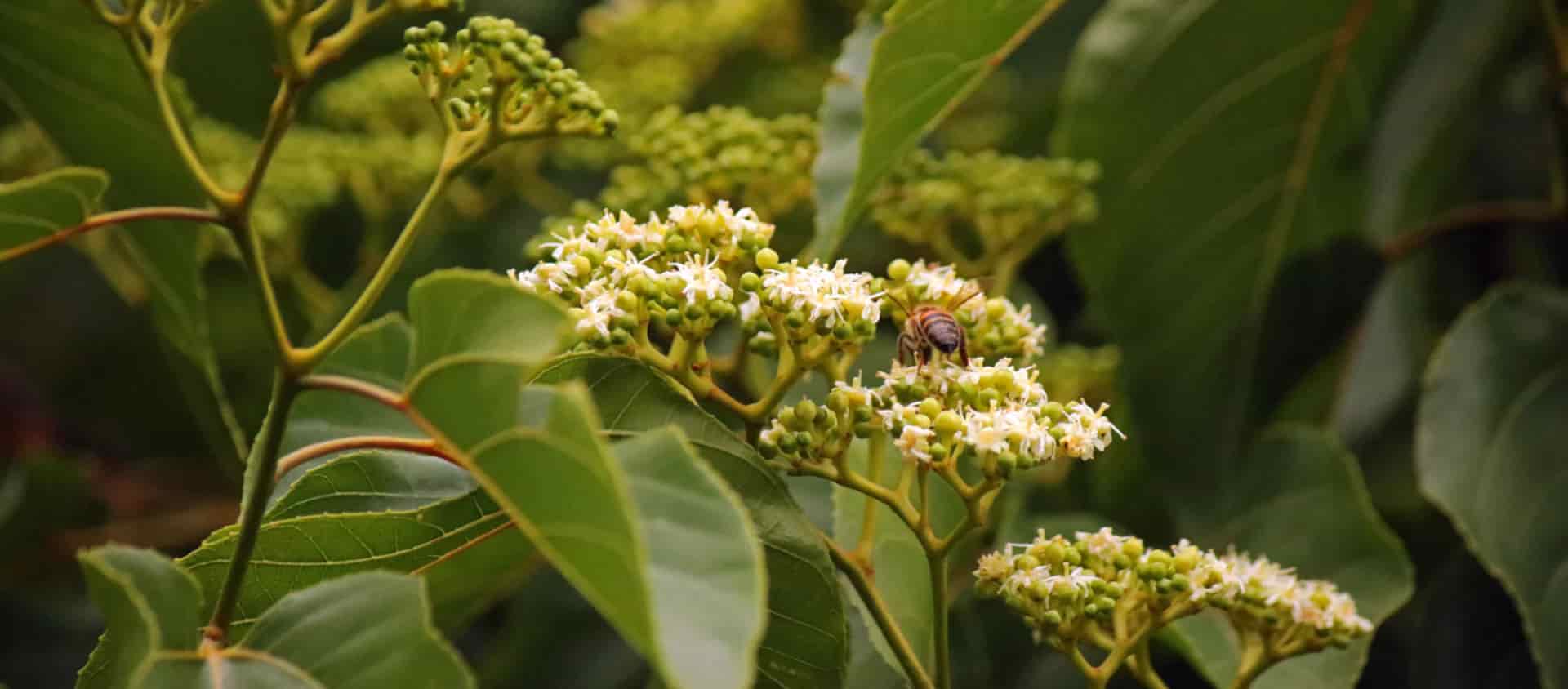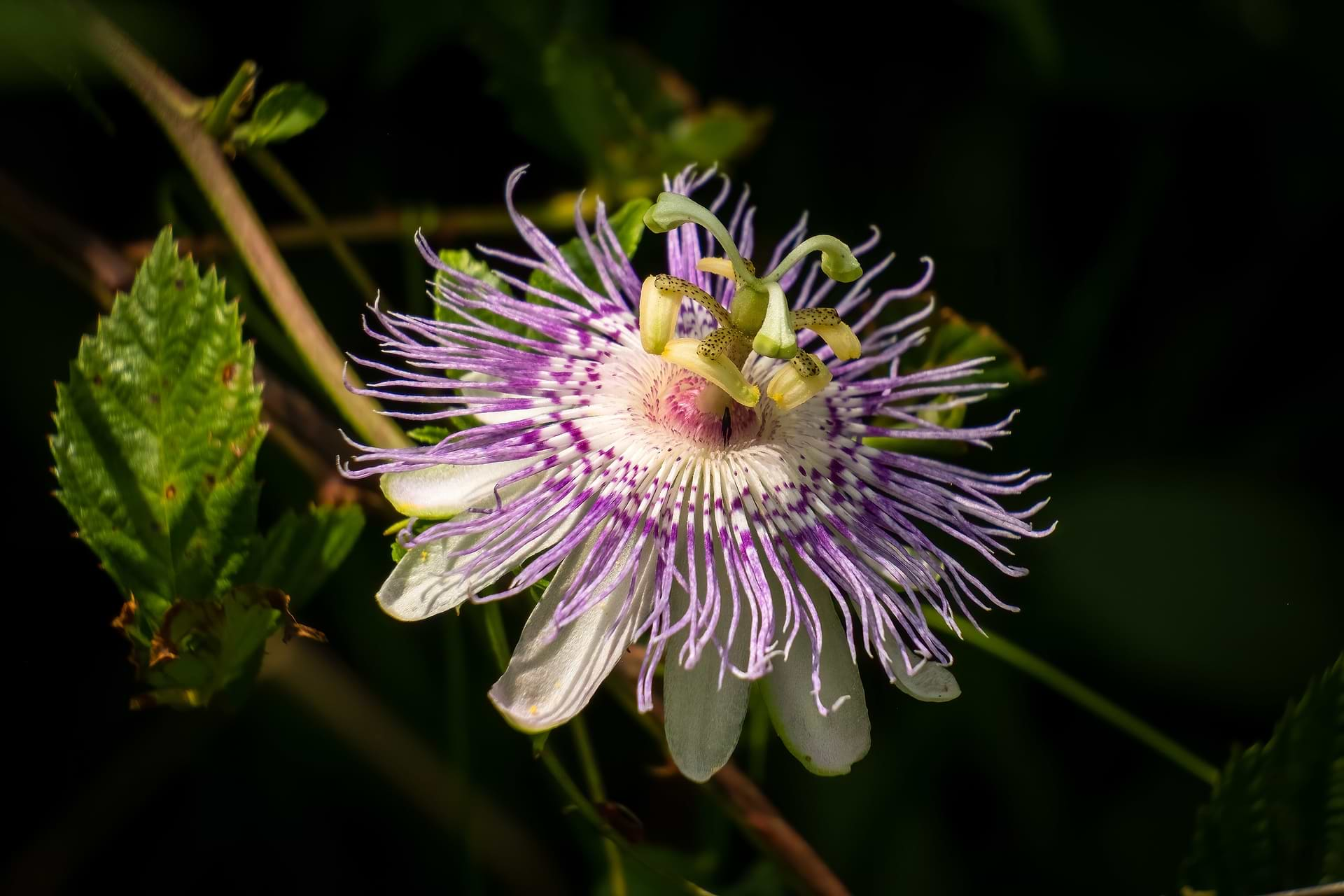If there were a beauty contest for medicinal plants, passionflower (Passiflora incarnata) would be a serious contender. With its striking purple-and-white filaments and intricate floral design, this vine isn’t just a visual showstopper, but it’s also a natural go-to when it comes to relaxation, sleep, and nervous system support.
Native to Central and South America, passionflower has long been cherished for its calming properties. Traditional healers, herbalists, and wise grandmothers alike have turned to this herb to quiet racing thoughts, ease digestive tension, support deep sleep, and help tight muscles finally chill out. From the rituals of the Aztecs to spots in modern European pharmacopeias, passionflower’s reputation as a gentle nervine is well-earned!
So if you’re feeling wired but tired, restless yet wiped, or just in need of a botanical exhale, passionflower might be the one for you!
Botanical Background: The Basics of Passionflower
Before we go deeper into passionflower’s incredible health benefits, it’s important to get to know the plant itself. Passionflower isn’t just another perennial climbing vine, it carries a rich history and unique botanical characteristics that make it as fascinating as it is functional. Passionflower is widely recognized in the realm of herbal medicines for its calming and therapeutic properties.
What’s in a Name?
Passionflower goes by many names around the world, each revealing something special about its identity or origin:
-
Maypop – A term used in the southeastern U.S. for its fruit, which “pops” when pressed.
-
Holy-Trinity Flower – Inspired by its religious symbolism in Christian theology.
-
Purple Passionflower – A nod to its signature color.
-
Water Lemon & Apricot Vine – Derived from its edible fruit.
Passionflower, scientifically known as Passiflora incarnata, is valued for both its beauty and its herbal benefits. Native to the southeastern United States, Central America, and South America, this plant has also gained popularity in Europe, where it’s widely cultivated for its medicinal uses. Its striking purple-and-white flowers and tangy, edible fruit make it a unique addition to gardens and herbal medicine cabinets alike.
Here are some other medications and key facts about passionflower:
-
Family: Passifloraceae
-
Appearance: A sprawling vine with spiraling tendrils, large intricate flowers, and small, tangy fruit.
-
Growing Conditions: Thrives in warm climates with partial sun and well-drained soil, often grown on trellises due to its climbing nature.
-
Herbal Uses: Leaves, flowers, and vines are commonly used for teas, tinctures, and capsules, while the fruit is enjoyed in culinary creations. Passionflower is often used to make a soothing flower tea known for its relaxation benefits.
Whether you’re sipping on herbal tea you made from its leaves or using it to brighten up your garden, passionflower offers a delightful combination of function and charm.
The Art of Harvesting & Cultivation

For those cultivating passionflower, timing is everything. Harvest the plant when its flowers are in early bloom when its beneficial compounds are at their peak. Store dried flowers, leaves, and vines in an airtight container, away from light and moisture, to preserve their potency.
Passionflower is more a passion flower than an herb. It’s nature’s reminder of beauty, resilience, and wellness, all wrapped in an elegant floral package!
Historical Use and Cultural Significance
Passionflower’s appeal goes far beyond its botanical brilliance. Over centuries, its calming and therapeutic properties have earned it a revered place in herbal medicine traditions across the globe, making it a popular alternative treatment . Passionflower has been a staple in various herbal remedies for its calming and therapeutic effects.
A Plant with a Story
With a name like passionflower, you know there’s some drama, and yes, it’s biblical. Spanish missionaries in Brazil were so struck by its intricate floral structure that they saw it as a divine symbol of the Passion of Christ:
-
Five stamens = Christ’s five wounds
-
Three styles = the three nails of the crucifixion
-
White petals = purity
-
Purple crown = the heavenly realm
While the spiritual symbolism is fascinating, passionflower’s healing roots run even deeper, crossing continents, cultures, and centuries.
Centuries of Calm
This isn’t just a pretty plant with poetic lore, it’s a time-tested herb with serious calming cred. Across generations and geographies, passionflower has been tapped to soothe the body and quiet the mind:
-
The Aztecs used it to still mental chatter and relax tense muscles.
-
Spanish colonists in Peru noted its sleep-inducing effects.
-
Native American tribes turned to it for calm, clarity, and even topical use.
-
19th-century Eclectic Physicians loved it for nervous exhaustion, digestion troubles, and a sore throat.
-
Today, Germany’s Commission E gives it an official herbal nod for nervousness and sleep support.
Modern science is catching up too, studies show passionflower may help ease restlessness, support better sleep, and encourage gentle relaxation without the grogginess.
From ancient rituals to modern tinctures, passionflower continues to prove that true herbal wisdom doesn’t fade with time, it just grows deeper roots.
Health Benefits and Medicinal Properties
Sure, it’s a stunner in the garden, but passionflower’s real glow-up comes from what it does inside the body. From calming frazzled nerves to supporting deep sleep and muscle relaxation, this herb has earned its place in the natural medicine spotlight.
1. Calms the Nervous System
If life has you feeling frazzled, passionflower can be a natural way to restore calm and focus. This gentle herb has been used for centuries to calm anxiousness and promote mental well-being and emotional balance.
-
Encourages relaxation without dulling your emotions.
-
Helps manage feelings of restlessness and agitation.
-
Preliminary studies suggest that passionflower may help promote calm in individuals experiencing occasional stress, including in clinical settings.
-
Promotes emotional stability, making it easier to handle daily pressures and challenges.
When paired with mindfulness practices, such as meditation or deep breathing exercises, passionflower provides a holistic approach to achieving a sense of calm and inner peace.
2. Promotes Restful Sleep
Tossing and turning? Say hello to one of nature’s best sleep aids.
-
Encourages deep, rejuvenating rest without leaving you groggy.
-
Maintains a healthy circadian rhythm.
-
Traditionally used in Mexico and Europe for sleep troubles.
-
Passionflower can enhance the effects of sedative medications, so it should be used with caution.
Bedtime just got better with the gentle, non-habit-forming power of passionflower.
3. Eases Muscle Tension
Whether it’s exercise-induced soreness, everyday stress, or monthly discomfort, passionflower is here to help ease physical tightness and promote relaxation.
-
Naturally relieves menstrual cramps, making that time of the month a little easier.
-
Helps post-workout muscles recover faster, so you’re ready for your next session.
-
Pairs perfectly with other stress-relieving herbs like valerian or chamomile for even greater benefits.
-
Passionflower also pairs well with other calming herbs like chamomile and valerian root for enhanced relaxation.
Think of it as a massage in herbal form, soothing tired muscles, calming your mind, and helping relieve stress as you breathe easier.
4. Supports Heart Health
Holistic wellness starts with a steady heart and a calm mind.
-
May help maintain healthy blood pressure, supporting overall cardiovascular health.
-
Promotes relaxation of blood vessels, soothing strain and enhancing circulation.
-
Helps balance heart rhythms, making it ideal for moments of emotional tension or stress.
A balanced nervous system paired with a steady heart creates the foundation for lasting vitality and overall well-being.
5. The Science Behind Passionflower
Passionflower’s therapeutic effects stem from its unique and powerful chemical composition, making it a valuable tool in holistic health:
-
Flavonoids – These free radical scavenging compounds support a healthy inflammatory response, helping to protect cells from damage.
-
Alkaloids – Known for their ability to promote relaxation, these natural chemicals help alleviate stress and encourage a sense of calm.
-
Glycosides – These contribute to passionflower’s calming effect on the nervous system, supporting better sleep and overall mental well-being.
Passion flower extract has been shown to improve neurotransmitter levels, leading to positive effects on mental health.
Backed by scientific research, passionflower has earned recognition as a natural, soothing agent that can enhance both physical and emotional health.
How to Use Passionflower
This chill-inducing herb is a top pick for tackling tension, chasing better sleep, or taking the edge off a hectic day. And passionflower is a bit of a flirt, it plays really well with others. Tag-teaming with calming companions like chamomile, scullcap, and valerian root, passionflower helps create a mellow mood magic that’s greater than the sum of its parts.
Best Forms of Use
-
Tea: If cozy had a flavor, it’d be Passionflower tea. Brewing up a warm cup is the OG way to tap into this herb’s calming vibes. It’s caffeine-free, naturally soothing, and the perfect sip-before-sleep sidekick. Think of it as your nightly “chill the heck out” ritual in a mug.
-
Tincture: Need calm now? Tinctures are your best friend. These potent liquid extracts are fast-acting and easy to stash in your bag, glove box, or office drawer—ready for those oh-so-fun moments like airport delays, tense meetings, or Monday mornings. Just a quick dropper dose, and you're on your way back to balance.
-
Capsules: Low-maintenance and high-impact, capsules are for the busy bees. They deliver a pre-measured dose of calm without the steeping, shaking, or mixing. Toss ’em in your bag, pop ’em with your morning routine, and boom—you’re set for the day.
Herbs are powerful (and we love that), but they’re not one-size-fits-all. Always check in with your healthcare provider before adding passionflower—or any herbal supplement—to your mix, especially if you’re on medications or managing a health condition.
The Power of Liquid Herbal Extracts
Why choose liquid herbal extracts over other forms? These concentrated tinctures offer several advantages that make them a superior choice for herbal supplementation:
-
Fast-Acting Benefits: Liquid extracts bypass the digestive process required for breaking down pills or capsules, allowing for quick absorption directly into your bloodstream.
-
Superior Absorption: Your body can absorb liquid herbs more efficiently than solid forms, making more of the beneficial compounds available for use.
-
Easy to Customize: Liquid extracts are simple to adjust for your needs.
-
Long Shelf Life: When properly stored, liquid herbal extracts maintain their potency for extended periods.
Synergistic Herb Combinations with Passion Flower Extract
Passionflower shines even brighter when paired with complementary herbs. These combinations can enhance its calming effects while providing additional benefits tailored to your needs. Here are some great pairings to explore:
-
Motherwort – For added heart and nervous system support.
-
Scullcap – To strengthen resilience against stress.
-
Rose – For a touch of emotional uplift.
-
Spearmint & Marshmallow Root – To improve flavor and support digestion.
Experiment with these combinations to create your perfect blend. Whether you’re crafting a tea, tincture, or herbal infusion, the right mix can elevate your herbal wellness routine in both effectiveness and enjoyment.
How WishGarden Uses Passionflower in Our Herbal Blends

At WishGarden, passionflower is one of our go-to herbs when it comes to emotional support, gentle nervous system care, and good old-fashioned chill. We blend it into some of our most beloved formulas because it plays so nicely with other calming herbs, and delivers results you can actually feel. Here’s where you’ll find this botanical beauty in our lineup:
-
Emotional Ally: A soothing blend for when emotions run high. Whether you're overwhelmed, weepy, or just need to soften the edges, Emotional Ally helps ground your mood without muting your spirit.
-
Serious Relaxer: Think of this one as your herbal “off switch.” Made for intense tension and tight shoulders, Serious Relaxer helps you unwind when your body and brain are both begging for a break.
-
Sleepy Nights: A gentle nudge into dreamland. Sleepy Nights is your go-to when you need help falling asleep, and staying asleep, without feeling groggy the next morning.
-
Liquid Bliss: Pure joy in a bottle. Liquid Bliss helps lift your mood and restore emotional balance when life feels heavy. Great for daily emotional maintenance or post-funk recovery.
-
Postpartum Emotional: Designed specifically for new moms navigating the emotional rollercoaster of early motherhood. This formula brings calm clarity when hormones and sleep deprivation are tag-teaming your sanity.
-
Serious PM Cough: Yep, passionflower isn’t just about emotions, it shows up here to help relax a tight, stubborn nighttime cough and promotes deep sleep so you can finally get some rest.
-
PMS Emotional: Mood swings, meet your match. PMS Emotional smooths out the rough edges of your cycle with herbs that support calm, emotional stability, and that sweet sense of “I got this.”
-
Sleepy Nights for Kids: A kid-friendly formula that helps little ones settle down when bedtime turns into a battle. Gentle enough for nightly use, with passionflower bringing the calm vibes.
-
Quiet Time for Kids: For those “wild energy” moments when your kiddo could use a soft landing. Quiet Time is ideal for after-school overstimulation, car rides, or anytime they need a chill reset.
-
Attention Ally (for Kids): Focus, meet herbs. Attention Ally supports clarity, attention span, and calm concentration. Great for classroom time, homework hour, or any situation where mental focus is key.
[[ recipeID=recipe-2m98zgoed, title=DIY Passionflower Relaxation Blend Tea ]]
A Floral Ally for Mind and Body
With its striking appearance and impressive benefits for relaxation, sleep, and heart health, passionflower is a must-have in your herbal wellness toolkit.
Whether you’re sipping a tea blend or taking a tincture for added calm, passionflower invites you to restore your balance naturally. Try it today and witness the glow of good health, one sip at a time.
Herbalist Q&A: Passionflower
Is passionflower better than melatonin?
It depends on what you need. Passionflower supports relaxation by calming the nervous system, while melatonin directly regulates sleep cycles. If you have trouble unwinding at night, passionflower may be a gentler, non-hormonal option, whereas melatonin is best for adjusting sleep patterns, like after jet lag. Some people even combine them for extra sleep support.
Does passionflower make you sleepy?
Not exactly! It helps you relax, which can make it easier to fall asleep, but it doesn’t act like a sedative. Passionflower supports natural sleep cycles by promoting calmness and reducing restlessness. It’s a great choice for those who struggle with a racing mind at bedtime but don’t want to feel groggy the next day.
What does passionflower do to the brain?
Passionflower interacts with GABA (gamma-aminobutyric acid), a neurotransmitter that helps regulate stress and relaxation. By increasing GABA activity, passionflower promotes a sense of calm, eases nervous tension, and supports mental well-being. This is why it’s often used for stress, restlessness, anxiety and insomnia as sleep support.
Can I take passionflower every day?
Yes, passionflower is generally safe for daily use when taken in appropriate amounts. It’s a gentle herb that can be used long-term for nervous system support, but it’s always best to take occasional breaks and consult a healthcare provider if you’re on medication or have any concerns. If using it for sleep, some people prefer to take it as needed rather than every night.
Rebecca Younger is passionate about herbs and women's health. She aspires to plant seeds of inspiration within her community about plant medicine and healthier ways of life. She studied Herbal Medicine at Herbalism Roots in Denver and is a certified Doula through the Matrona Foundation. She is the Brand Communications Specialist at WishGarden Herbs.
For educational purposes only. This information has not been evaluated by the Food and Drug Administration. This information is not intended to diagnose, treat, cure, or prevent any disease, or to sell any product.
Recommended Products
Further Reading














